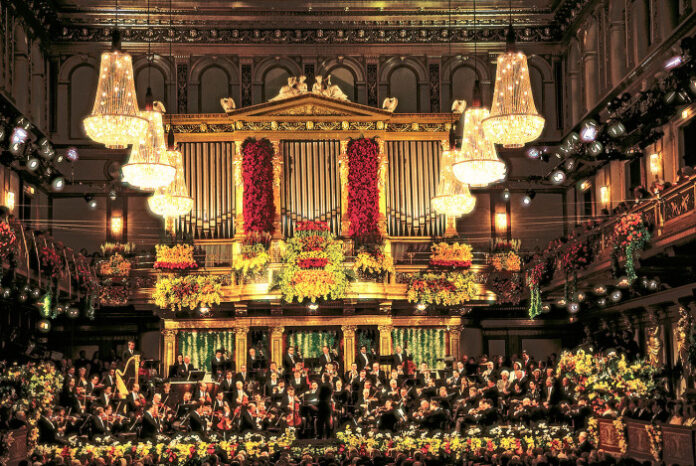Golden Hall, Vienna
Located in the heart of Europe, Austria’s influential history, rich culture, fascinating landscapes and a well-developed infrastructure make it one of the most visited countries in Europe.
Throughout history, Austria has always played a special role in the centre of Europe: as a bridge-builder, as a meeting place and as a venue for cultural exchange. Guests find most beautiful mountain and lake landscapes, numerous cultural institutions, vibrant cities, exquisite delights and friendly people.
Refining traditions to the peak
Austria’s attractive cities with rich history and the international well known “Austrian cuisine” have been shaped by the Habsburg Empire. Today, the Hofburg and Schönbrunn Palace in Vienna bear witness to the former grandeur of the Empire. With a population of more than 50 million, until 1918 the Imperial territory was the world’s third biggest multinational state, extending from today’s northern Italy to today’s western Ukraine. Today’s much smaller Austria has remained a cultural melting pot and its cultural wealth is the result of a great variety of influences from East and West, North and South. Each nation, each people contributed its traditions and culinary cultures. Austrian therefore stands for receptiveness to diverse influences and love of refining existing traditions until they reach their peak.
Schönbrunn Palace, Vienna
The capital Vienna is internationally well-known for its classicist architecture, its extensive cultural programme, cosy little coffee houses and, of course, music. Vienna and music are inseparable. World-famous composers such as Beethoven and Mozart are closely associated with Vienna. No other cosmopolitan city has succeeded in transferring its musical legacy into the present and enriching it internationally with modern impulses. From the most famous cultural festival in the world, like the “Salzburger Festspiele”, to the small, fine jazz concert: The diversity of the music programme in Austria is overwhelming.
Culinary lifestyle trends – Austrian style
Austria’s colourful cuisine has much to offer: the famous “Wiener Schnitzel”, variations of dumplings and, above all, tempting desserts are witnesses to a long culinary tradition. Shaped by diverse influences and traditions and combined with innovative concepts, Austrian cuisine is based on regionality and quality. Regionalism, sustainability and lived tradition are the omnipresent buzzwords in modern cuisine and lifestyle trends, but in reality are often a front for very little. Yet Austria has lived by, produced and cooked at the highest level, according to these principles, for centuries. High-quality food flourishes in the clean water and fresh air. That makes Austrian cuisine unique. This is especially due to the people. Austrian hosts are full of passion for regional cuisine. There are specialities and moments of pleasure to be discovered in every region.
Viennese Schnitzel
Austrian hearts not only beat faster for food but also for drink. And tradition, innovation and regionalism are reflected here too. Wine growing has been very important in Austria for more than two thousand years and Austrian wines are famous worldwide. The diversity of Austria’s wine country, from the Wachau beside the river Danube, to the south Styrian wine route, is reflected in the varieties of wines, that without doubt are among the best in the world.
Winter in Austria: A dream in snow and ice
In addition to a wide range of cultural offerings and culinary delights, Austria is the ideal destination for nature lovers. Whether summer or winter, whether skiing, sledging, cross-country skiing, hiking or swimming, Austria offers fantastic natural scenery for all kinds of outdoor activities. Clear mountain lakes and rivers, lush grasslands and green forests offer visitors the chance to discover nature in its original, untouched state first-hand.
Winter in Austria
Austria is also a well-known paradise for winter lovers. Snowy landscapes and sunshine – the most passionate combination since skiing was invented (in Austria). The Alpine country is famous for its pistes, routes and cross-country skiing trails that criss-cross the landscapes. Skiing, cross-country skiing, snowboarding or a leisurely walk in snow-covered landscapes – no matter what “snow fans” burn for, Austria is a winter wonderland. After a happy day in the snow, fragrant Christmas markets and cosy alpine huts are the best places to relax and rewind.
The combination of innovatively cultivated traditions in the areas of art, culture and culinary delights, as well as unspoilt nature, outdoor activities in fresh air and hospitable surroundings, is what distinguishes Austria and makes it one of the most attractive destinations for tourists from all over the world.
Salzburg in Winter
Please find more information about your next holiday to Austria via the Austrian National Tourist office: www.austria.info/en
https://www.bmeia.gv.at/en/european-foreign-policy/foreign-trade/refocus-austria/event-calendar/
Facebook: @feelaustriaTH
Instagram: @visitaustria










